Index
The
Americans Who Risked Everything
From the
Pulpit to the Battlefield
(The Black Robed Regiment)
First Congress
Education: The Original
Purpose
Congressional Concern for Bible Shortage
See also:
The founders and Slavery
Black Founders
"Patriots of Color"©
1776 Project: "Communicating
the genius of our founding to future generations"
The Americans Who Risked Everything
by Rush Limbaugh Jr.
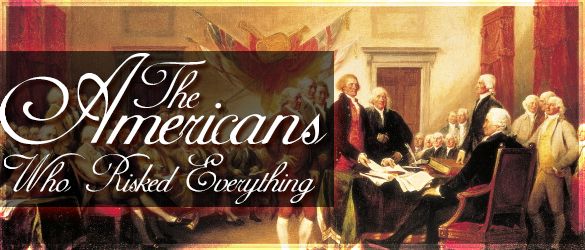
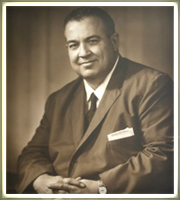 ...These
men knew what they risked. The penalty for treason was death by hanging.
And remember, a great British fleet was already at anchor in New York
Harbor. They were sober men. There were no dreamy-eyed intellectuals or
draft card burners here. They were far from hot-eyed fanatics yammering
for an explosion. They simply asked for the status quo. It was change they
resisted. It was equality with the mother country they desired. It was
taxation with representation they sought. They were all conservatives, yet
they rebelled.
...These
men knew what they risked. The penalty for treason was death by hanging.
And remember, a great British fleet was already at anchor in New York
Harbor. They were sober men. There were no dreamy-eyed intellectuals or
draft card burners here. They were far from hot-eyed fanatics yammering
for an explosion. They simply asked for the status quo. It was change they
resisted. It was equality with the mother country they desired. It was
taxation with representation they sought. They were all conservatives, yet
they rebelled.
...Even before the list was
published, the British marked down every member of Congress suspected of
having put his name to treason. All of them became the objects of vicious
manhunts. Some were taken. Some, like Jefferson, had narrow escapes. All
who had property or families near British strongholds suffered. ...John
Hart of Trenton, New Jersey, risked his life to return home to see his
dying wife. Hessian soldiers rode after him, and he escaped in the woods.
While his wife lay on her deathbed, the soldiers ruined his farm and
wrecked his homestead. Hart, 65, slept in caves and woods as he was hunted
across the countryside. When at long last, emaciated by hardship, he was
able to sneak home, he found his wife had already been buried, and his 13
children taken away. He never saw them again. He died a broken man in
1779, without ever finding his family.
...Of those 56 who signed the
Declaration of Independence, nine died of wounds or hardships during the
war. Five were captured and imprisoned, in each case with brutal
treatment. Several lost wives, sons or entire families. One lost his 13
children. Two wives were brutally treated. All were at one time or another
the victims of manhunts and driven from their homes. Twelve signers had
their homes completely burned. Seventeen lost everything they owned. Yet
not one defected or went back on his pledged word. Their honor, and the
nation they sacrificed so much to create is still intact. And, finally,
there is the New Jersey signer, Abraham Clark. He gave two sons to the
officer corps in the Revolutionary Army. They were captured and sent to
that infamous British prison hulk afloat in New York Harbor known as the
hell ship Jersey, where 11,000 American captives were to die. The younger
Clarks were treated with a special brutality because of their father. One
was put in solitary and given no food. With the end almost in sight, with
the war almost won, no one could have blamed Abraham Clark for acceding to
the British request when they offered him his sons' lives if he would
recant and come out for the King and Parliament. The utter despair in this
man's heart, the anguish in his very soul, must reach out to each one of
us down through 200 years with his answer: "No."
...The 56 signers of the
Declaration Of Independence proved by their every deed that they made no
idle boast when they composed the most magnificent curtain line in
history. "And for the support of this Declaration with a firm reliance on
the protection of divine providence, we mutually pledge to each other our
lives, our fortunes, and our sacred honor."

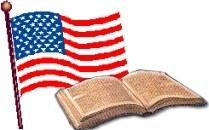 From
the Pulpit to the Battlefield
From
the Pulpit to the Battlefield
By Wendy Griffith
CBN News
July 4, 2007
(Only the video
is at the CBN link. The full article and video is below.)
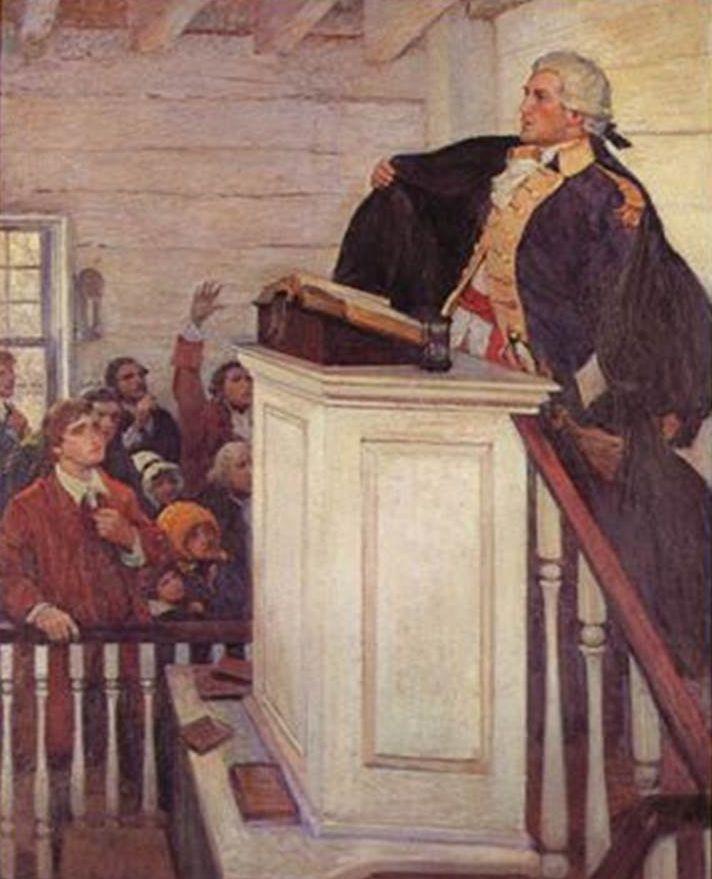 October 1, 1746
-- John Peter Muhlenberg was born
on this day. (He would die on the same date in 1807). For a time,
Muhlenberg pastored a church in Virginia. One Sunday in 1776, he ended
his sermon with these words: "In the language of the Holy Writ,
there is a time for all things. There is a time to preach and a time to
fight." Then, he removed his clerical robes to reveal an army
uniform. Three hundred men from the congregation rode off with him to
join George Washington's 8th Virginia regiment.
October 1, 1746
-- John Peter Muhlenberg was born
on this day. (He would die on the same date in 1807). For a time,
Muhlenberg pastored a church in Virginia. One Sunday in 1776, he ended
his sermon with these words: "In the language of the Holy Writ,
there is a time for all things. There is a time to preach and a time to
fight." Then, he removed his clerical robes to reveal an army
uniform. Three hundred men from the congregation rode off with him to
join George Washington's 8th Virginia regiment.
There have been
many books written on our nation's beginnings, but what is not commonly
known is the crucial role that churches and Christians played in defending
and founding what was to become the United States of America. CBN News
filed this report from the site of the first battle of the American
Revolutionary War.
...Nearly all of the
MinuteMen were Christians -- parishioners of the town's only church,
pastored by the Rev. Jonas Clark. He himself was known as a great patriot
and often preached revolution from the pulpit. The minister was also often
the one in charge of organizing the town's militia, as every town was
required by law to have a militia that was trained and ready to fight if
necessary. This monument marks the spot where the town of Lexington's
church stood for about 150 years.
"The ministers
were often the only educated people in town; they had a captive audience
once a week, and it was the only time everyone got together," said Dick
Kollen, a historian with the Lexington Historical Society. "And so, if the
minister was of a mind to use the pulpit to try and influence people to
the Patriot point of view, they would look to him, and he was a very
important authority figure."
We're all familiar
with the famous midnight ride of Paul Revere -- well, this is where he
came, to the home of the Rev. Jonas Clark. He came to warn Clark and his
two prominent guests -- John Hancock and Sam Adams -- that the British
were indeed coming. Kollen said, "That fact is, the British were
coming, but they were walking -- 15 miles away. So Capt. Parker says, 'Go
home, but be within the sound of the drum.'"
When the battle at
Lexington was over, two British soldiers were injured and eight MinuteMen
were dead. Their bodies are buried on the Battle Green underneath a war
monument. The words on the monument could not be more patriotic. They say:
"On April 19, 1775, the die was cast!! The blood of the martyrs, in the
cause of God and their country, was the cement of the Union of these
states, then colonies." It goes on to say that "they nobly dared to be
free, and the peace, liberty and independence of the United States of
America was their glorious reward!"
"Almost all of the
MinuteMen were Christians, that's the first thing we need to understand,"
said Tom Barrett, editor and publisher of Conservativetruth.org. "They
believed that all authority was subject to the authority of God, and they
knew they were doing the will of God by fighting oppression. They realized
that the British had abused their authority and really enslaved the
Colonists. And they knew that if they didn't fight the oppressors, no one
else would."
There were many
other influential clergy involved in the Revolutionary War, including
Lutheran Rev. John Peter Muhlenberg of Woodstock, Virginia. Before
marching off to join George Washington's army, at Washington's request,
Muhlenberg delivered a powerful sermon from Ecclesiastes 3:1-8 that
concluded with these words: "The Bible tells us there is a time for all
things, and there is a time to preach and a time to pray -- but the time
for me to preach has passed away, and there is a time to fight, and that
time has come now. Now is the time to fight!" Barrett said,
"With that, he took off his robe to reveal the uniform of a Virginia
Colonel - he then took his musket from behind the pulpit, put on his
Colonel's hat and marched off to lead his men to war!" Throughout the war,
sustaining morale was a real struggle at home. Very often, the ministers
were the ones who were looked to for that purpose.
The clergy were so
influential in the war effort that the British, and those loyal to the
crown, referred to them as the Black Regiment because they wore black
robes. "The king was afraid of the ministers," Barrett said, "because they
refused to acknowledge the divine authority of the King. Their battle-cry
was no king but 'King Jesus.'"
...Today, many
scholars admit that the role of clergy and Christians is down-played in
our nation's text books. "We're supposed to ignore and pretend that the
Christian foundation of this nation never existed," Barrett said. "And I
believe it's our responsibility as Christians to make sure that our
children are raised knowing that this is, was, and always will be a
Christian nation. People of other religions are welcome to live here, but
this is a nation founded on the word of God, and we should never forget
that."
The Black
Robe Regiment The Pastor-Patriots of the Revolution - By
Al Maxey - ...These men, and
there were a great many of them, were not just patriots, they were
pastors. They were the leaders of their congregations, the moral
motivators of the people, the spiritual shepherds of the flock of God in
this new land. They were also a vital part of, indeed the voice and soul
of, the movement to secure liberty from British tyranny. Thus, many of
the government leaders were also leaders in the churches. The same was
true of those who later took up arms to defend the colonies. Pastors
would often go from pulpit to battlefield, leading the men of the
congregation into war with the British troops. Their sermons were filled
with a call to liberty. As the American Revolution approached, it was
the pastors who called their members to take up arms, who would lead
them in military drills following the Sunday services, and who would
lead them into battle. These church members, who could be "ready in a
minute" to confront the enemy, and who were recruited and trained
largely by their pastors, were known as the "Minutemen." Historians are
quick to point out that had it not been for the influence of the early
American pastors, both in their sermons from the pulpit promoting
liberty, as well as their leadership on the field of battle, the history
of our nation might very well have been written differently. One
historian, Tom Barrett, observed, "I do not consider it a stretch at all
to say that were it not for the pastors and churches of colonial
America, our land would be a British colony today" [The Forgotten
Holiday].
...On May 9, 1789, in an article titled "The Importance of the
Protestant Religion Politically Considered," which appeared in the
Washington, D.C. newspaper Gazette of the United States, we find this
glowing endorsement of these brave pastors: "Our truly patriotic clergy
boldly and zealously stepped forth and bravely stood our distinguished
sentinels to watch and warn us against approaching danger; they wisely
saw that our religious and civil liberties were inseparably connected
and therefore warmly excited and animated the people resolutely to
oppose and repel every hostile invader. May the virtue, zeal and
patriotism of our clergy be ever particularly remembered." Maybe John
Wingate Thornton (1818-1878), an attorney and historian, summed it up
most succinctly in the following statement from his book "The Pulpit of
the American Revolution" -- "To the pulpit, the Puritan pulpit, we owe
the moral force which won our independence." We enjoy the freedoms we
enjoy today due, in large part, to the pastors who motivated our
forefathers to rise up and break free from their bondage to British
tyranny, and who then willingly laid their lives on the line by taking
up arms and leading their congregations in fighting for that freedom.
May God raise up a Black Robe Regiment today with the same courage of
conviction to stand boldly in their pulpits and call the people to
freedom in Christ and freedom from tyranny, both religious and secular.
A nation is lost when its pastors fail the people from the pulpits!!
On
OCTOBER 26, 1774, the Provincial Congress of Massachusetts
reorganized their defenses with one-third of their regiments being
"Minutemen," ready to fight at a minute's notice. These citizen soldiers
drilled on the parade ground, many times led by a deacon or pastor, then
went to church for exhortation and prayer. The Provincial Congress
charged: "You...are placed by Providence in the post of honor, because
it is the post of danger... The eyes not only of North America and the
whole British Empire, but of all Europe, are upon you. Let us be,
therefore, altogether solicitous that no disorderly behavior, nothing
unbecoming our character as Americans, as citizens and Christians, be
justly chargeable to us." The Provincial Congress issued a Resolution to
Massachusetts Bay, 1774: "Resistance to tyranny becomes the Christian
and social duty of each individual... Continue steadfast, and with a
proper sense of your dependence on God, nobly defend those rights which
heaven gave, and no man ought to take from us." Boston patriot Josiah
Quincy stated: "Under God, we are determined that wheresoever,
whensoever, or howsoever we shall be called to make our exit, we will
die free men."

First Congress:
What is purposely no longer
taught in schools and college.
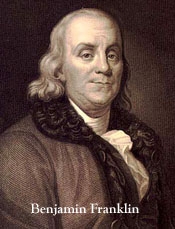 How America's
Constitution Convention Began: Constitutional Convention: June 28, 1787,
Thursday, was embroiled in a bitter debate over how each state was to be
represented in the new government. The hostile feelings created by the smaller
states being pitted against the larger states was so bitter that some delegates
actually left the Convention. Benjamin Franklin, being the President (Governor)
of Pennsylvania, hosted the rest of the 55 delegates attending the Convention.
Being the senior member of the convention, at 81 years of age, he commanded the
respect of all present, and, as recorded on James Madison's detailed records, he
arose to address the Congress in this moment of crisis:
How America's
Constitution Convention Began: Constitutional Convention: June 28, 1787,
Thursday, was embroiled in a bitter debate over how each state was to be
represented in the new government. The hostile feelings created by the smaller
states being pitted against the larger states was so bitter that some delegates
actually left the Convention. Benjamin Franklin, being the President (Governor)
of Pennsylvania, hosted the rest of the 55 delegates attending the Convention.
Being the senior member of the convention, at 81 years of age, he commanded the
respect of all present, and, as recorded on James Madison's detailed records, he
arose to address the Congress in this moment of crisis:
"Mr. President, the small
progress we have made after four or five weeks close attendance & continual
reasoning's with each other - our different sentiments on almost every
question, several of the last producing as many noes as ayes, is methinks a
melancholy proof of the imperfection of the Human Understanding. We indeed seem
to feel our own want of political wisdom, since we have been running about in
search of it. We have gone back to ancient history for models of government, and
examined the different forms of those Republics, which, having been formed with
the seeds of their own dissolution, now no longer exist. And we have viewed
Modern States all around Europe, but find none of their Constitutions suitable
to our circumstance.
In this situation of this
Assembly, groping as it were in the dark to find political truth, and scarce
able to distinguish it when presented to us, how has it happened, Sir, that
we have not hitherto once thought of humbly applying to the Father of lights to
illuminate our understanding?
In the beginning of the
Contest with Great Britain, when we were sensible of danger we had daily
prayer in this room for the Divine protection - Our prayers, Sir, were
heard, and they were graciously answered. All of us who were engaged in the
struggle must have observed frequent instances of a superintending providence in
our favor.
To that kind providence we
owe this happy opportunity of consulting in peace on the means of establishing
our future national felicity. And have we now forgotten that powerful Friend?
or do we imagine we no longer need His Assistance?
I have lived. Sir, a long
time, and the longer I live, the more convincing proofs I see of this truth -
that God Governs in the affairs of men.
And if a sparrow cannot fall to the ground without His notice, is it
possible that an empire can rise without His aid?
We have been assured,
Sir, in the Sacred Writings, that "except the Lord build the house, they labor
in vain that build it." (Psalm
127:1) I firmly believe this; and I also believe that without his concurring
aid we shall succeed in this political building no better than the Builders of
Babel: We shall be divided by our partial local interests; our projects will be
confounded, and we ourselves shall become a reproach and bye word down to future
ages. And what is worse, mankind may hereafter from this unfortunate
instance, despair of establishing Governments by Human wisdom and leave it to
chance, war and conquest.
I therefore beg leave to
move - that henceforth prayers imploring the assistance of Heaven, and its
blessings on out deliberations, be held in this Assembly every morning before we
proceed to business, and that one or more of the clergy of this city be
requested to officiate in that service."
Jonathan Dayton, delegate
from New Jersey, reported the reaction of Congress to Dr. Franklin's rebuke:
"The Doctor sat down; and never did I behold a countenance at once so dignified
as was that of Washington at the close of the address; nor were the members of
the convention generally less affected. The words of the venerable Franklin fell
upon our ears with a weight and authority, even greater than we may suppose an
oracle to have had in a Roman senate." And: "We assembled again; and...every
unfriendly feeling had been expelled, and a spirit of conciliation had been
cultivated." (America's God and Country: Encyclopedia of Quotations by
William J. Federer pp. 150-152)
See also:
The Constitutional
Convention - Gordon Lloyd, a professor at Pepperdine University, has
constructed the best, most comprehensive and user-friendly resource on the
Constitutional Convention debates available on the web

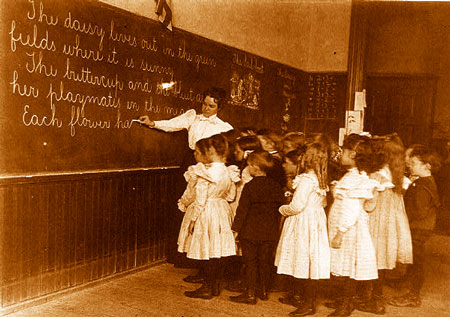
Education - The
original purpose
The
Christian Origin of American Education
- By Stephen A. Flick, PhD Executive
Director Christian Heritage Fellowship ...Only those who have never read primary sources or those who are eager to
subvert truth would ever suggest that America was not founded upon Christian
principles. America's Founding Fathers understood the necessity of Christian
education in the classrooms of the nation. Volumes could be written to support
this fact, but several select quotes should demonstrate this.
Dr. Benjamin Rush, signer of the Declaration of Independence and one of the
three most important Founding Fathers,[5] and perhaps the most distinguished
physician of his generation, defended the teaching of Scripture and the
Christian religion in public schools in his Defense of the Use of the Bible in
Schools. In an address to Revolutionary War chaplain, Rev. Jeremy Belknap,
pastor of the Congregational Church in Dover, New Hampshire, Dr. Rush summarized
his argument: It is now several months since I promised to give you my reason
for preferring the Bible, as a schoolbook, to all other compositions. Before I
state my arguments, I shall assume the five following propositions:
1. The Christianity is the only true and perfect religion; and that, in
proportion as mankind adopt its principles, and obey its precepts, they will be
wise and happy.
2. That a better knowledge of this religion is to be acquired by reading the
Bible, than in any other way.
3. That the Bible contains more knowledge necessary to man in his present
state, than any other book in the world.
4. That knowledge is most durable, and religious instruction most useful,
when imparted in early life.
5. That the Bible, when not read in schools, is seldom read in any subsequent
period of life
...One of the chief means of denying America's Christian heritage is
historical omission. Secularists and those seeking to deny America's Christian
origin conveniently fail to relate the religious beginnings of colonial America.
Pastors and their influence upon early America are routinely neglected. ...One
of many preachers to infuse the Christian faith into American academics was John
Witherspoon. As a Presbyterian minister, president of Princeton, and signer of
the Declaration of Independence, Witherspoon trained at least 87 founding
Fathers.
...Rev. Dr. Jedediah Morse, father of the inventor of the telegraph, Samuel
Morse, is known as the "Father of American Geography." During the American
Revolution, Rev. Morse was very active for the American cause. He was largely
credited with initiating the study of geography in American schools. In 1784, he
published his first book, Geography Made Easy.
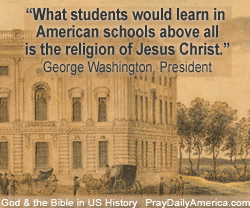 The sentiment of this textbook used so widely in American classrooms was
reflected in one of Rev. Morse's printed sermons for a national fast day: "The
foundations which support the interests of Christianity, are also necessary to
support a free and equal government like our own. In all those countries where
there is little or no religion, or a very gross and corrupt one, as in Mahometan
[Muslim] and pagan countries, there you will find, with scarcely a single
exception, arbitrary and tyrannical governments, gross ignorance and wickedness,
and deplorable wretchedness among the people. To the kindly influence of
Christianity, we owe that degree of civil freedom, and political and social
happiness which mankind now enjoy. In proportion as the genuine effects of
Christianity are diminished in any nation, either through unbelief, or the
corruption of its doctrines, or the neglect of its institutions; in the same
proportion will the people of that nation recede from the blessings of genuine
freedom, and approximate the miseries of complete despotism. I hold this to be a
truth confirmed by experience. If so, it follows, that all efforts made to
destroy the foundations of our holy [Christian] religion, ultimately tend to the
subversion also of our political freedom and happiness. Whenever the pillars of
Christianity shall be overthrown, our present republican forms of government,
and all the blessings which flow from them, must fall with them."
The sentiment of this textbook used so widely in American classrooms was
reflected in one of Rev. Morse's printed sermons for a national fast day: "The
foundations which support the interests of Christianity, are also necessary to
support a free and equal government like our own. In all those countries where
there is little or no religion, or a very gross and corrupt one, as in Mahometan
[Muslim] and pagan countries, there you will find, with scarcely a single
exception, arbitrary and tyrannical governments, gross ignorance and wickedness,
and deplorable wretchedness among the people. To the kindly influence of
Christianity, we owe that degree of civil freedom, and political and social
happiness which mankind now enjoy. In proportion as the genuine effects of
Christianity are diminished in any nation, either through unbelief, or the
corruption of its doctrines, or the neglect of its institutions; in the same
proportion will the people of that nation recede from the blessings of genuine
freedom, and approximate the miseries of complete despotism. I hold this to be a
truth confirmed by experience. If so, it follows, that all efforts made to
destroy the foundations of our holy [Christian] religion, ultimately tend to the
subversion also of our political freedom and happiness. Whenever the pillars of
Christianity shall be overthrown, our present republican forms of government,
and all the blessings which flow from them, must fall with them."
In
1950, the Florida Supreme Court declared
:
"A people unschooled about the
sovereignty of God, the Ten Commandments, and the ethics of Jesus, could never
have evolved the Bill of Rights, the Declaration of Independence, and the
Constitution. There is not one solitary fundamental principle of our democratic
policy that did not stem directly from the basis moral concepts as embodied in
the Decalogue." [Ten Commandments]
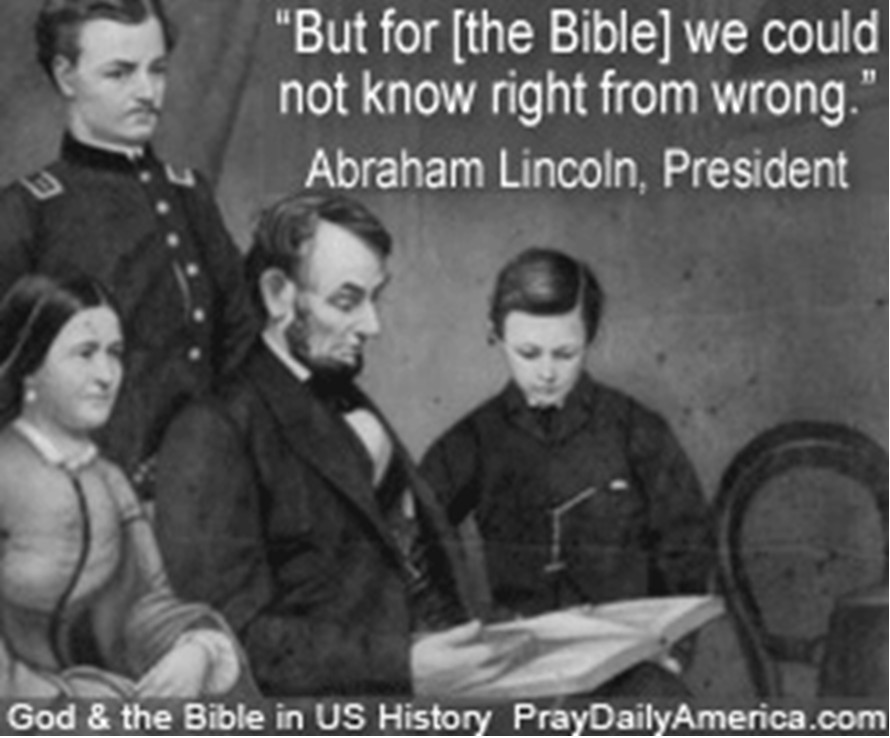 Schools were originally set
up by Churches for the purpose of Bible teaching.
Schools were originally set
up by Churches for the purpose of Bible teaching.
In 1690 Connecticut
established a Literacy Law with a fine of $25 (extremely considerable for that
time) because children must be able to read if they are to read the Scriptures.
Also in 1690, Benjamin
Harris' New England Primer textbook with a memorization rhyming alphabet was
introduced using Scripture to teach reading and pronunciation. This Primer was
reprinted and used for 210 years, until 1900. And Benjamin Rush warned if
America ever removed the Bible from the classroom, all of our time will be spent
fighting crime.
In 1818, Thomas Jefferson described the goals of
education: "To give to every citizen the information he needs for the
transaction of his own business; To enable him to calculate for himself, and to
express and preserve his ideas, his contracts and accounts, in writing; To
improve by reading, his morals and faculties; To understand his duties to his
neighbors and country, and to discharge with competence the functions confided
to him by either; To know his rights; to exercise with order and justice those
he retains; to choose with discretion the fiduciary of those he delegates; and
to notice their conduct with diligence, with candor and judgment; And, in
general, to observe with intelligence and faithfulness all the social relations
under which he shall be placed."
In 1781 Congress ruled that
a new English edition of the Bible be printed and used by schools.
In
1782, the U.S. Congress voted in favor of a resolution recommending and
approving the Bible for use in the schools.
.
Noah Webster provided the
text book, History of the United States, used for over 60 years in public
schools contained this statement: "The moral principles and precepts contained
in the Scripture ought to form the basis of all our civil constitutions and
laws." And " All the miseries and evils which men suffer from - vice, crime, ambition,
injustice, oppression, slavery, and war - proceed from their despising or
neglecting the precepts contained in the Bible."
Fisher Ames, the founding father who
actually wrote the First Amendment, expressed his belief that the Bible was to
play a prominent role in public education when he said: "It has been the custom
of late years to put a number of little books into the hands of children,
containing fables and moral lessons. Why then, if these books for children must
be retained, should not the bible regain the place it once held as a school
book? Its morals are pure, its examples captivating and noble. The reverence for
the sacred book that is thus impressed lasts long" (T)he bible will justly
remain the standard of language as well as faith." And
"We are spending less
time in the classroom on the Bible, which should be the principle text in our
schools. The Bible states these great moral lessons better than any other
manmade book."
William Holmes McGuffey, author of the
McGuffey Reader used in our public schools until 1963, said: "The Christian
religion is the religion of our country. From it are derived our notions on
the character of God, on the great moral Governor of the universe. On its
doctrines are founded the peculiarities of our free institutions. From no
other source has the author drawn more conspicuously than from the sacred
Scriptures. From these extracts from the Bible I make no apology."
Of the first 108 universities founded in America, 106 were distinctly
Christian, including the first, Harvard University,
chartered in 1636. In the original Harvard Student Handbook, rule No.1 was
students seeking entrance must know Latin and Greek so they can study the
Scriptures: "Let every student be plainly instructed and earnestly pressed
to consider well, the main end of his life and studies is, to know God and
Jesus Christ, which is eternal life, John 17:3; and therefore to lay Jesus
Christ as the only foundation for our children to follow the moral
principles of the Ten Commandments."
Rev. John Harvard. The College at Cambridge was renamed for him. Son
of a butcher, his family died when a plague swept England, leaving him an
estate. He attended Emmanuel College, was ordained, married and sailed for
Massachusetts where he pastored the First Church of Charlestown. He died of
tuberculosis at age 31, on September 14, 1638. He was Rev. John Harvard.
The College at Cambridge was renamed for him. Ten of twelve Harvard
presidents prior to the Revolution were ministers, as were 50 percent of
17th-century graduates. Harvard's founders wrote: "After God had carried us
safe to New England, and we...rear'd convenient places for God's
worship...dreading to leave an illiterate Ministry to the Churches, when
our present Ministers shall lie in the Dust...it pleased God to stir up the
heart of one Mr. Harvard, a godly gentleman and a lover of learning...to
give the one half of his estate...towards the erecting of a college and all
his Library." As 106 of the first 108 schools in America were founded on
Christianity, Harvard's Rules & Precepts, September 26, 1642, stated: "Let
every Student be plainly instructed, and earnestly pressed to consider
well, the main end of his life and studies is, to know God and Jesus Christ
which is eternal life. Jn 17:3."
--American Minute
with Bill Federer September 14
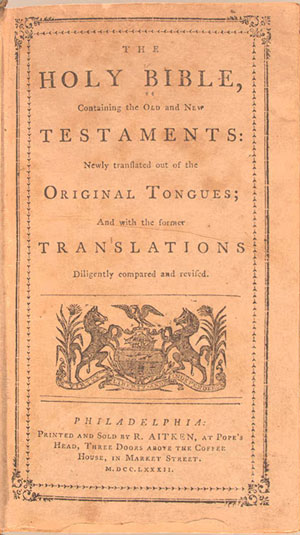 Congressional
Concern for Bible Shortage - Was the Bible important to the Continental
Congress during the earliest days of the Revolution? The Continental Congress
was evacuating Philadelphia as the British had just won the Battle of
Brandywine, forcing Washington's troops to retreat to Valley Forge.
Congressional
Concern for Bible Shortage - Was the Bible important to the Continental
Congress during the earliest days of the Revolution? The Continental Congress
was evacuating Philadelphia as the British had just won the Battle of
Brandywine, forcing Washington's troops to retreat to Valley Forge.
In addition,
Congress was informed that the war had interrupted trade with the King's
authorized printers in England, thereby causing a shortage of Bibles, commonly
used in education. On September 11, 1777, the
fledgling organization approved and recommended that 20,000 copies of the Bible
be imported from outside the Colonies because there was a great shortage of
Bibles due to the interruptions in trade with England. A special Congressional
Committee examined the matter, and recommended that "the Bibles be imported from
Holland, Scotland, or elsewhere, into the different parts of the States of the
Union."
The Bibles were ordered and paid for by the young government. Their purpose?
"The use of the Bible is so universal and its importance so great...it was
resolved accordingly to direct said Committee of Commerce to import 20,000
copies of the Bible," and "For distribution among the troops battling for
independence." The first page of each Bible was inscribed, "Approved for the
American people." A few years later, Congress approved a distinctly American
Bible. Aitken's Bible, published under Congressional patronage, was the first
English language Bible published on the North American continent.
September 10,
1782, the Continental Congress again responded to the shortage of Bibles by
authorizing the publisher of The Pennsylvania Magazine, Robert Aitken, who died
JULY 15, 1802, to print America's first English language Bible- "A neat edition
of the Holy Scriptures for the use of schools." Congress stated: "Resolved, That
the United States in Congress assembled highly approve the...undertaking of Mr.
Aitken...and...recommend this edition of the Bible to the inhabitants of the
United States, and hereby authorize him to publish this recommendation."
The
U.S. Congress of 1803, at the request of President Thomas Jefferson, allocated
federal funds for the salary of a minister and for the construction of a church.
On December 3, 1803, the U.S. Congress, following the request of President
Jefferson, ratified a treaty with the Kaskaskia Indians. This treaty was
significant because Congress, recognizing that most members of the tribe had
become Christians, deemed to give an annual subsidy of $100 for the support of a
priest during a seven-year period. That priest, as the Congress noted, was to
perform the duties of his office, and... instruct as many... children as
possible.

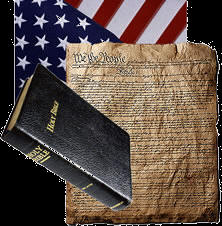 Did you know?
Did you know?
![]() Home
Home
![]() About
About
![]() Contact
Contact
![]() Search
Search
![]() News,
Commentary, & Action
News,
Commentary, & Action ![]() Recommended Books
Recommended Books




 October 1, 1746
October 1, 1746

 The sentiment of this textbook used so widely in American classrooms was
reflected in one of Rev. Morse's printed sermons for a national fast day: "The
foundations which support the interests of Christianity, are also necessary to
support a free and equal government like our own. In all those countries where
there is little or no religion, or a very gross and corrupt one, as in Mahometan
[Muslim] and pagan countries, there you will find, with scarcely a single
exception, arbitrary and tyrannical governments, gross ignorance and wickedness,
and deplorable wretchedness among the people. To the kindly influence of
Christianity, we owe that degree of civil freedom, and political and social
happiness which mankind now enjoy. In proportion as the genuine effects of
Christianity are diminished in any nation, either through unbelief, or the
corruption of its doctrines, or the neglect of its institutions; in the same
proportion will the people of that nation recede from the blessings of genuine
freedom, and approximate the miseries of complete despotism. I hold this to be a
truth confirmed by experience. If so, it follows, that all efforts made to
destroy the foundations of our holy [Christian] religion, ultimately tend to the
subversion also of our political freedom and happiness. Whenever the pillars of
Christianity shall be overthrown, our present republican forms of government,
and all the blessings which flow from them, must fall with them."
The sentiment of this textbook used so widely in American classrooms was
reflected in one of Rev. Morse's printed sermons for a national fast day: "The
foundations which support the interests of Christianity, are also necessary to
support a free and equal government like our own. In all those countries where
there is little or no religion, or a very gross and corrupt one, as in Mahometan
[Muslim] and pagan countries, there you will find, with scarcely a single
exception, arbitrary and tyrannical governments, gross ignorance and wickedness,
and deplorable wretchedness among the people. To the kindly influence of
Christianity, we owe that degree of civil freedom, and political and social
happiness which mankind now enjoy. In proportion as the genuine effects of
Christianity are diminished in any nation, either through unbelief, or the
corruption of its doctrines, or the neglect of its institutions; in the same
proportion will the people of that nation recede from the blessings of genuine
freedom, and approximate the miseries of complete despotism. I hold this to be a
truth confirmed by experience. If so, it follows, that all efforts made to
destroy the foundations of our holy [Christian] religion, ultimately tend to the
subversion also of our political freedom and happiness. Whenever the pillars of
Christianity shall be overthrown, our present republican forms of government,
and all the blessings which flow from them, must fall with them."  Schools were originally set
up by Churches for the purpose of Bible teaching.
Schools were originally set
up by Churches for the purpose of Bible teaching. 